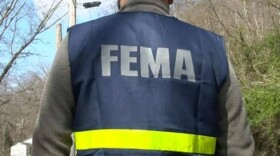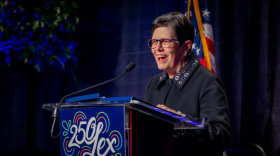AUDIE CORNISH, HOST:
From NPR News, this is ALL THINGS CONSIDERED. I'm Audie Cornish.
ROBERT SIEGEL, HOST:
And I'm Robert Siegel.
The destitute city of Detroit is getting some help today from America's biggest bank. JPMorgan Chase is pouring $100 million into the Motor City. The gift could help build momentum for an even bigger aid package to help Detroit through bankruptcy. It could also help repair the bank's battered reputation and that of its CEO. Jamie Dimon made a personal appearance in Detroit to announce the gift.
Here's Sarah Hulett of Michigan Radio.
SARAH HULETT, BYLINE: For a lot of people, Jamie Dimon will forever be linked to the mortgage crisis that hit Detroit as hard as any city.
But there was no mention of that at today's announcement, of course. Instead, there was a plated lunch - chicken and salad, with cupcakes - an uplifting video, and a standing ovation led by Michigan's governor, Rick Snyder.
(APPLAUSE)
GOVERNOR RICK SNYDER: That's the Detroit, Michigan thank you, you deserve. Thank you.
(APPLAUSE)
HULETT: The bulk of the $100 million-commitment from JPMorgan Chase will go to business loans, addressing blight and job training. And Jamie Dimon says, make no mistake, he doesn't consider this a charitable contribution.
JAMIE DIMON: We are a, just to make it clear, a for-profit institution...
(LAUGHTER)
DIMON: And we are making an investment in Detroit.
HULETT: Forty million dollars will be targeted for two Detroit investment funds that are already lending money to city businesses, including this one.
(SOUNDBITE OF BARKING DOGS)
LIZ BLONDY: My name is Liz Blondy and I'm the owner of Canine to Five. We offer dog day care, dog boarding and dog grooming.
HULETT: Since she opened nine years ago, Blondy has received two loans worth about $150,000, from one of the two development funds that will share the JPMorgan Chase money. Now, Blondy is ready to expand again and she says she's gone to traditional lenders.
BLONDY: They're not interested in financing it because of the real estate values in the city of Detroit.
HULETT: But nonprofit lenders appear much more willing to take a risk on Detroit businesses like Blondy's. And she says it's those lenders that are going to drive redevelopment here.
Governor Snyder says this infusion of cash from JPMorgan Chase is another sign of Detroit's comeback. And he hopes it will help nudge along a deal to get the state to pony up for an aid package.
SNYDER: 'Cause this is a sign to show Detroit is coming back and to give more people confidence that by doing the settlement, it will only accelerate the comeback of the city, which helps all the State of Michigan.
HULETT: Those bills cleared a first hurdle today. But there's still significant resistance, especially by Republicans fearing election-year retribution from a Tea Party-affiliated group funded by the Koch brothers.
And to be clear, the money Chase is spending here has nothing to do with that bankruptcy deal referred to as the Grand Bargain. That deal is intended to protect pensioners from steeper cuts and keep city-owned artworks off the auction block.
So why is JPMorgan Chase spreading cash around Motown?
DENNIS KELLEHER: One of the things they do is try to help their reputation enhancement by showing up for photo ops.
HULETT: That's Dennis Kelleher, a former lobbyist who now heads Better Markets, a non-profit group advocating for regulatory reform. Kelleher says remember that JPMorgan Chase helped create the economic wreckage in Detroit. It was fined $13 billion for its lending practices. And keep this in mind: It's a $2 trillion bank, and Dimon's compensation last year alone was more than $20 million.
KELLEHER: So it's great that they're investing in Detroit, as they should have been doing all along. But $100 million from JPMorgan Chase is not even a drop in the bucket. It's probably the equivalent of about $10 to a regular person.
HULETT: Or maybe it's like $10 to a person who's not just broke but deeply in debt and looking for any help he can get to get back on his feet.
For NPR News, I'm Sarah Hulett in Detroit. Transcript provided by NPR, Copyright NPR.








